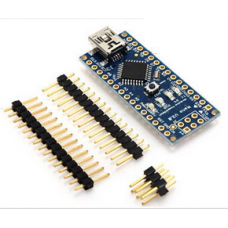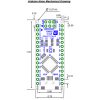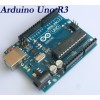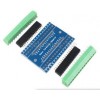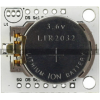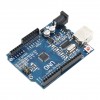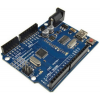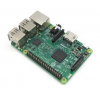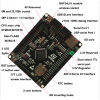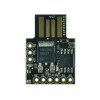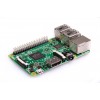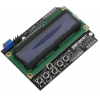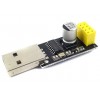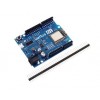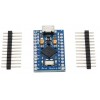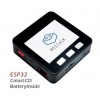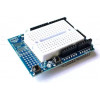Shopping Cart
0 item(s) - R0.00- 3D Printing and Plastic peripherals (8)
- 433Mhz and Lora (9)
-
Amateur Radio (651)
- - Antenna Analyzer (12)
- - APRS (12)
- - ATU (5)
- - CW (1)
- - Digital Modes (9)
- - DMR (4)
- - Echolink (10)
- - Enclosure (13)
- - Eshail-2 (QO-100) (67)
- - GPS (8)
- - iGate (1)
- - Microcontrollers (43)
- - Microphone (1)
- - Power Supply (7)
- - Programming Cable (6)
- - QRP (9)
- - Radio interface (21)
- - Receiver (9)
- - Repeater (4)
- - RF Amplifiers (20)
- - RF Kits (19)
- - RF modules (116)
- - Rotator (1)
- - SDR (75)
- - Spectrum Analyzer (4)
- - SWR (9)
- - Transceiver (59)
- - WSPR (5)
- Antennas and Acc (320)
- Audio and Video (28)
- Bargain Box (1)
- Battery (3)
- Bluetooth (11)
- Cables (37)
- Computer Peripherals (104)
- Connectors (90)
- Data acquisition (1)
- Display (2)
- Electromechanical (25)
- Enclosure (12)
- GPS (6)
- Hardware (3)
- Home Automation (128)
- Inverter (9)
- Liquid (7)
- Lora (8)
- Microcontrollers (119)
- Modbus (3)
- MQTT (14)
- Network Radio (3)
- Networking (8)
- Power (133)
- Power supply (49)
- Radio Interface (17)
- RF Modules (142)
- ROIP (2)
- Satellite (93)
- Security (13)
- Sensor (17)
- Solar (14)
- Test and Measurements (66)
- Tools and Equipment (8)
- VOIP (10)
- Weather (1)
Arduino USB Nano V3.0 4.0 Atmega328P 5V Board
Ex Tax: R78.00
Add to Compare
Arduino USB Nano V3.0 Atmega328P 5V Board (Arduino Nano v3.0 Pro Mini)
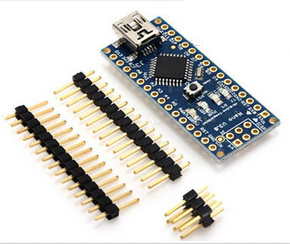
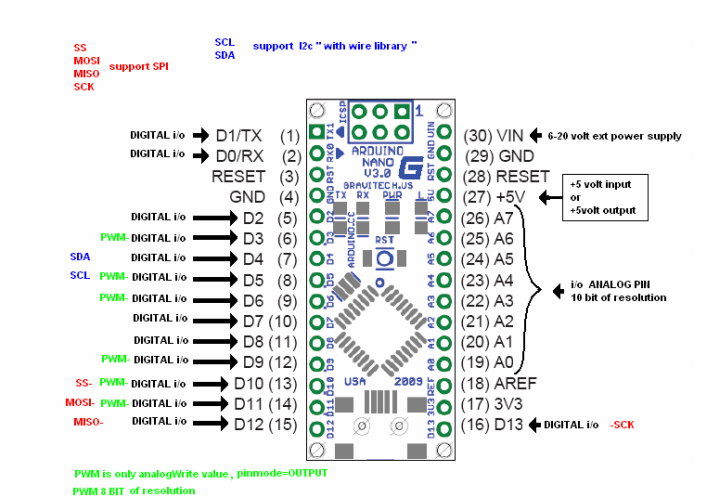
The USB port of this device can not be used with Windows 8.
Economy Nano is fully compatible with Arduino NANO. The difference is that USB TO TTL, FT232RL chip is replased by a cheaper alternative PL2303. The PL2303 driver needs to be installed separately for Windows XP, Windows 7, 32 bit The driver can be found on google but here is a link where you can down load it http://prolificusa.com/pl-2303hx-drivers/
Description
- Microcontroller: ATmega328
- Operating Voltage (logic level): 5 V
- Input Voltage (recommended): 7-12 V
- Input Voltage (limits): 6-20 V
- Digital I/O Pins: 14 (of which 6 provide PWM output)
- Analog Input Pins: 8
- DC Current per I/O Pin 40 mA
- Flash Memory: 32 KB (ATmega328) of which 2 KB used by bootloader
- SRAM: 2 KB (ATmega328)
- EEPROM: 1 KB (ATmega328)
- Clock Speed: 16 MHz
- Dimensions: 0.73" x 1.70"
Arduino-compatible Arduino pro mini:
- ATmega328 running at 16MHz with external resonator (0.5% tolerance)
- USB connection off board
- Supports auto-reset
- Max 150mA output
- Over current protected
- Reverse polarity protected
- DC input 5V up to 12V
- On board Power and Status LEDs
- Size:(Long)33mm *(wide1)18 mm *(high)6mm
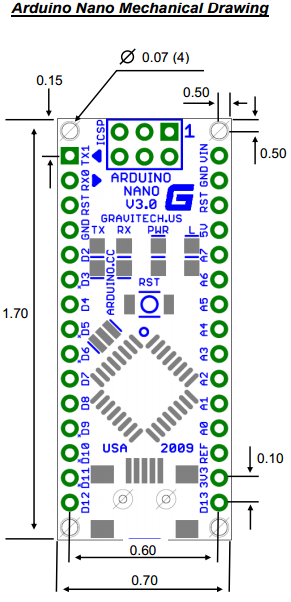
Input and Output
Each of the 14 digital pins on the Nano can be used as an input or output, using pinMode(), digitalWrite(), anddigitalRead() functions. They operate at 5 volts. Each pin can provide or receive a maximum of 40 mA and has an internal pull-up resistor (disconnected by default) of 20-50 kOhms. In addition, some pins have specialized functions:
- Serial: 0 (RX) and 1 (TX). Used to receive (RX) and transmit (TX) TTL serial data. These pins are connected to the corresponding pins of the FTDI USB-to-TTL Serial chip.
- External Interrupts: 2 and 3. These pins can be configured to trigger an interrupt on a low value, a rising or falling edge, or a change in value. See the attachInterrupt() function for details.
- PWM: 3, 5, 6, 9, 10, and 11. Provide 8-bit PWM output with the analogWrite() function.
- SPI: 10 (SS), 11 (MOSI), 12 (MISO), 13 (SCK). These pins support SPI communication, which, although provided by the underlying hardware, is not currently included in the Arduino language.
- LED: 13. There is a built-in LED connected to digital pin 13. When the pin is HIGH value, the LED is on, when the pin is LOW, it's off.
The Nano has 8 analog inputs, each of which provide 10 bits of resolution (i.e. 1024 different values). By default they measure from ground to 5 volts, though is it possible to change the upper end of their range using theanalogReference() function. Additionally, some pins have specialized functionality:
- I2C: 4 (SDA) and 5 (SCL). Support I2C (TWI) communication using the Wire library (documentation on the Wiring website).
There are a couple of other pins on the board:
- AREF. Reference voltage for the analog inputs. Used with analogReference().
- Reset. Bring this line LOW to reset the microcontroller. Typically used to add a reset button to shields which block the one on the board.
Programming
The Arduino Nano can be programmed with the Arduino software.
The ATmega328 on the Arduino Nano comes preburned with a bootloader that allows you to upload new code to it without the use of an external hardware programmer. It communicates using the original STK500 protocol.
You can also bypass the bootloader and program the microcontroller through the ICSP (In-Circuit Serial Programming) header.
more info at http://www.tweaking4all.com/hardware/arduino/arduino-enc28j60-ethernet/
Ardunio Comparison Chart.
| Name | Processor | Operating Voltage/Input Voltage |
CPU Speed |
Analog In/Out |
Digital IO/PWM |
EEPROM [KB] |
SRAM [KB] |
Flash [KB] |
USB | UART |
| Uno | ATmega328 | 5 V/7-12 V | 16 Mhz | 06/01/00 | 14/6 | 1 | 2 | 32 | Regular | 1 |
| Due | AT91SAM3X8E | 3.3 V/7-12 V | 84 Mhz | 12/02/14 | 54/12 | - | 96 | 512 | 2 Micro | 4 |
| Leonardo | ATmega32u4 | 5 V/7-12 V | 16 Mhz | 12/01/00 | 20/7 | 1 | 2.5 | 32 | Micro | 1 |
| Mega 2560 | ATmega2560 | 5 V/7-12 V | 16 Mhz | 16/0 | 54/15 | 4 | 8 | 256 | Regular | 4 |
| Mega ADK | ATmega2560 | 5 V/7-12 V | 16 Mhz | 16/0 | 54/15 | 4 | 8 | 256 | Regular | 4 |
| Micro | ATmega32u4 | 5 V/7-12 V | 16 Mhz | 12/01/00 | 20/7 | 1 | 2.5 | 32 | Micro | 1 |
| Mini | ATmega328 | 5 V/7-9 V | 16 Mhz | 08/01/00 | 14/6 | 1 | 2 | 32 | - | - |
| Nano | ATmega168 ATmega328 |
5 V/7-9 V | 16 Mhz | 08/01/00 | 14/6 | 0.512 1 |
1 2 |
16 32 |
Mini-B | 1 |
| Ethernet | ATmega328 | 5 V/7-12 V | 16 Mhz | 06/01/00 | 14/4 | 1 | 2 | 32 | Regular | - |
| Esplora | ATmega32u4 | 5 V/7-12 V | 16 Mhz | - | - | 1 | 2.5 | 32 | Micro | - |
| ArduinoBT | ATmega328 | 5 V/2.5-12 V | 16 Mhz | 06/01/00 | 14/6 | 1 | 2 | 32 | - | 1 |
| Fio | ATmega328P | 3.3 V/3.7-7 V | 8 Mhz | 08/01/00 | 14/6 | 1 | 2 | 32 | Mini | 1 |
| Pro (168) | ATmega168 | 3.3 V/3.35-12 V | 8 Mhz | 06/01/00 | 14/6 | 0.512 | 1 | 16 | - | 1 |
| Pro (328) | ATmega328 | 5 V/5-12 V | 16 Mhz | 06/01/00 | 14/6 | 1 | 2 | 32 | - | 1 |
| Pro Mini | ATmega168 | 3.3 V/3.35-12 V 5 V/5-12 V |
8 Mhz 16Mhz |
06/01/00 | 14/6 | 0.512 | 1 | 16 | - | 1 |
| LilyPad | ATmega168V ATmega328V |
2.7-5.5 V/2.7-5.5 V | 8 Mhz | 06/01/00 | 14/6 | 0.512 | 1 | 16 | - | - |
| LilyPad USB | ATmega32u4 | 3.3 V/3.8-5V | 8 Mhz | 04/01/00 | 09/04/14 | 1 | 2.5 | 32 | Micro | - |
| LilyPadSimple | ATmega328 | 2.7-5.5 V/2.7-5.5 V | 8 Mhz | 04/01/00 | 09/04/14 | 1 | 2 | 32 | - | - |
| LilyPadSimpleSnap | ATmega328 | 2.7-5.5 V/2.7-5.5 V | 8 Mhz | 04/01/00 | 09/04/14 | 1 | 2 | 32 | - | - |
Write a review
Your Name:Your Review: Note: HTML is not translated!
Rating: Bad Good
Enter the code in the box below:
Giga Technology © 2025

